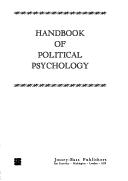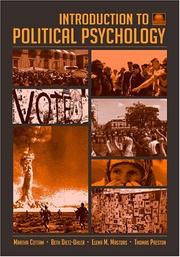| Listing 1 - 10 of 166 | << page >> |
Sort by
|
Book
ISBN: 9780199984367 Year: 2013 Publisher: New York Oxford University Press
Abstract | Keywords | Export | Availability | Bookmark
 Loading...
Loading...Choose an application
- Reference Manager
- EndNote
- RefWorks (Direct export to RefWorks)
Political psychology applies what is known about human psychology to the study of politics. It examines citizens’ vote choices and public opinion as well as how political leaders deal with threat, mediate political conflicts, and make foreign policy decisions. The second edition of the Oxford Handbook of Political Psychology gathers together a distinguished group of international scholars to shed light on such questions as: To what extent are people’s political choices influenced by information outside of conscious awareness? Does personality affect leadership style? Do strong emotions distort the political process and worsen or enhance political decisions? Focusing on political psychology at the individual level (genes, early childhood, personality, decision-making, emotions, values, ideology) and the collective (group identity, social justice, mass mobilization, political violence, prejudice reduction), this interdisciplinary volume covers models of the mass public and political elites and addresses both domestic issues and foreign policy. The volume provides an up-to-date, comprehensive, and expertly distilled account of cutting-edge research within both psychology and political science.
Political psychology --- Mass political behavior --- Political behavior --- Political science --- Politics, Practical --- Psychology, Political --- Psychology --- Social psychology --- Psychological aspects --- E-books
Book
ISBN: 0814765688 9780814765685 Year: 1977 Volume: 17 Publisher: New York (N.Y.): New York University press,
Abstract | Keywords | Export | Availability | Bookmark
 Loading...
Loading...Choose an application
- Reference Manager
- EndNote
- RefWorks (Direct export to RefWorks)
Political sociology --- Political psychology --- Psychologie politique --- Mass political behavior --- Political behavior --- Political science --- Politics, Practical --- Psychology, Political --- Psychology --- Social psychology --- Psychological aspects --- Political psychology.

ISBN: 2700721446 9782700721447 Year: 1986 Volume: vol *7 Publisher: Paris : Aubier,
Abstract | Keywords | Export | Availability | Bookmark
 Loading...
Loading...Choose an application
- Reference Manager
- EndNote
- RefWorks (Direct export to RefWorks)
Political psychology --- Mass political behavior --- Political behavior --- Political science --- Politics, Practical --- Psychology, Political --- Psychology --- Social psychology --- Psychological aspects --- Political psychology. --- Freud (Sigmund) --- Freud (Sigmund). --- Freud, Sigmund,

ISBN: 0875891748 9780875891743 Year: 1973 Publisher: San Francisco (Calif.): Jossey-Bass,
Abstract | Keywords | Export | Availability | Bookmark
 Loading...
Loading...Choose an application
- Reference Manager
- EndNote
- RefWorks (Direct export to RefWorks)
Political psychology --- Psychologie politique --- Mass political behavior --- Political behavior --- Political science --- Politics, Practical --- Psychology, Political --- Psychology --- Social psychology --- Psychological aspects --- Political psychology.

ISBN: 9781841694450 9781138802018 9781315445687 9781315445656 Year: 2017 Publisher: New York, NY : Routledge,
Abstract | Keywords | Export | Availability | Bookmark
 Loading...
Loading...Choose an application
- Reference Manager
- EndNote
- RefWorks (Direct export to RefWorks)
In recent decades, research in political psychology has illuminated the psychological processes underlying important political action, both by ordinary citizens and by political leaders. As the world has become increasingly engaged in thinking about politics, this volume reflects exciting new work by political psychologists to understand the psychological processes underlying Americans? political thinking and action. In 13 chapters, world-class scholars present new in-depth work exploring public opinion, social movements, attitudes toward affirmative action, the behavior of political leaders, the impact of the 9/11 attacks, and scientists? statements about global warming and gasoline prices. Also included are studies of attitude strength that compare the causes and consequences of various strength-related constructs. This volume will appeal to a wide range of researchers and students in political psychology and political science, and may be used as a text in upper-level courses requiring a scholarly and contemporary review of major issues in the field.
Political psychology. --- Psychologie politique --- Mass political behavior --- Political behavior --- Political science --- Politics, Practical --- Psychology, Political --- Psychology --- Social psychology --- Psychological aspects --- Political psychology
Book
ISBN: 9781107672529 9781107017689 9781139084550 1107017688 110767252X 1107424038 1139084550 Year: 2013 Publisher: Cambridge: Cambridge university press,
Abstract | Keywords | Export | Availability | Bookmark
 Loading...
Loading...Choose an application
- Reference Manager
- EndNote
- RefWorks (Direct export to RefWorks)
This book provides an introduction to political psychology through a focus on European politics and topics. It describes a style of doing political psychology in Europe that has developed out of dialogue with as well as critique of North American approaches. By emphasising the theoretical and methodological diversity of political psychology, the book is intended to contribute to a greater understanding of the strength and utility of the field. • Opens up and extends the study of political psychology to a variety of socio-political contexts and manifestations of political behaviour • Clearly outlines the usefulness and promises of distinctive critical approaches in social and political psychology • Explicitly considers the role of language, communication, identity and social representations in the construction of political meanings. Political Psychology will appeal to upper-level students and scholars who seek to extend their knowledge of the complex relationship between psychology, politics and society.
Political psychology --- Political psychology - Europe --- Political psychology. --- Mass political behavior --- Political behavior --- Political science --- Politics, Practical --- Psychology, Political --- Psychology --- Social psychology --- Psychological aspects

ISBN: 3866490275 9783866490277 3866498292 Year: 2006 Publisher: Opladen Budrich
Abstract | Keywords | Export | Availability | Bookmark
 Loading...
Loading...Choose an application
- Reference Manager
- EndNote
- RefWorks (Direct export to RefWorks)
Psychology --- Politics --- Political psychology --- #SBIB:324H20 --- Mass political behavior --- Political behavior --- Political science --- Politics, Practical --- Psychology, Political --- Social psychology --- Politologie: theorieën (democratie, comparatieve studieën….) --- Psychological aspects
Book
ISBN: 1316997847 1108644082 1108486088 1108627250 Year: 2019 Publisher: Cambridge : Cambridge University Press,
Abstract | Keywords | Export | Availability | Bookmark
 Loading...
Loading...Choose an application
- Reference Manager
- EndNote
- RefWorks (Direct export to RefWorks)
The first comprehensive examination of restraint in international politics, considered across a range of psychological, social, political, and institutional contexts as a political process, device, and strategy. Surveying how restraint has been understood in international relations and political theory, with focus given to Aristotle and Machiavelli, Steele utilises Carl Jung's theories of complexes and the libido to broaden the conceptual definition of restraint as a phenomenon that is not only individual and inward-looking, but also relational and societal. Exploring its development, uses, expressions and challenges through history and in contemporary times, this book analyses the politics of restraint in processes of security, political economy, foreign policy and global public health. Situating restraint alongside similar concepts such as moderation, containment, and constraint, Steele asks against what, and from what, are we restraining ourselves, who authorizes restraint, and what are the risks and rewards (both ethical and practical). Steele concludes with a balanced political and normative argument for restraint going forward.
International relations --- Political psychology. --- Mass political behavior --- Political behavior --- Political science --- Politics, Practical --- Psychology, Political --- Psychology --- Social psychology --- Political psychology --- Psychological aspects. --- Moral and ethical aspects. --- Psychological aspects
Book
ISBN: 9780190634155 9780190634131 0190634154 0190634138 Year: 2018 Publisher: New York : Oxford University Press
Abstract | Keywords | Export | Availability | Bookmark
 Loading...
Loading...Choose an application
- Reference Manager
- EndNote
- RefWorks (Direct export to RefWorks)
Behavioral Political Science (BPS) is a new approach to political science that is rooted in the belief that concepts, models, and research approaches from different disciplines (such as Psychology, Economics, Communication), can deepen our understanding of political behavior and political decision making. In recent years, a significant body of literature based in the behavioral approach has emerged, enriching our perception of ways by which a wide range of cognitive, emotional, and motivational factors impact actors' thinking processes and behavior choices in different strategic, political, and other social settings. In this introduction we discuss the behavioral political science approach and the ability of behavioral-oriented research to explain many of the phenomena that deviate from the traditional rational choice models that have dominated the field for decades. We present the chapters included in the four sections of the Handbook: bounded rationality and heuristics; theoretical approaches; attitudes; BPS research methods
Political psychology --- Mass political behavior --- Political behavior --- Political science --- Politics, Practical --- Psychology, Political --- Psychology --- Social psychology --- Psychological aspects --- Behaviorism (Political science)

ISBN: 0805837701 Year: 2004 Publisher: Mahwah, N.J. Erlbaum
Abstract | Keywords | Export | Availability | Bookmark
 Loading...
Loading...Choose an application
- Reference Manager
- EndNote
- RefWorks (Direct export to RefWorks)
The first comprehensive textbook on political psychology, this user-friendly volume explores the psychological origins of political behavior. Using psychological concepts to explain types of political behavior, the authors introduce a broad range of theories and cases of political activity to illustrate the behavior. The book examines many patterns of political behaviors including leadership, group behavior, voting, race, ethnicity, nationalism, political extremism, terrorism, war, and genocide. Text boxes highlight current and historical events to help students see the connection between the
Political psychology. --- Sociale psychologie --- Handboeken en inleidingen. --- Political philosophy. Social philosophy --- #SBIB:324H20 --- #SBIB:324H60 --- Mass political behavior --- Political behavior --- Political science --- Politics, Practical --- Psychology, Political --- Psychology --- Social psychology --- Politologie: theorieën (democratie, comparatieve studieën….) --- Politieke socialisatie --- Psychological aspects --- Political psychology
| Listing 1 - 10 of 166 | << page >> |
Sort by
|

 Search
Search Feedback
Feedback About UniCat
About UniCat  Help
Help News
News